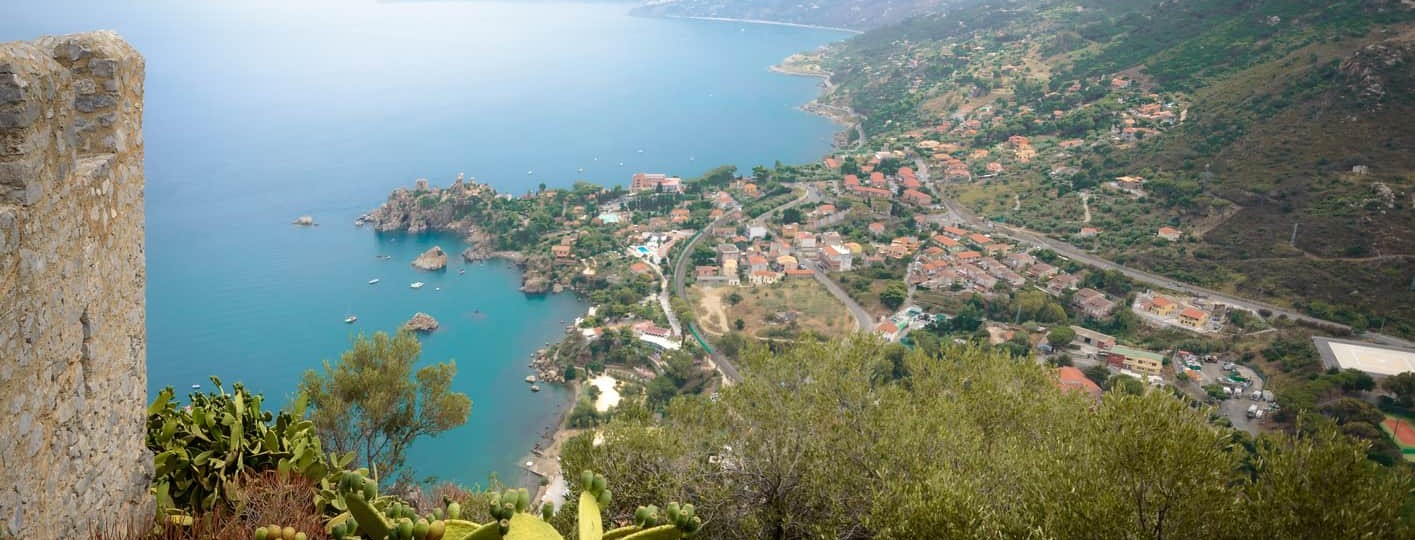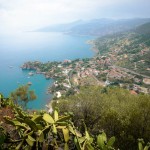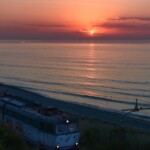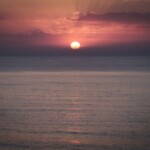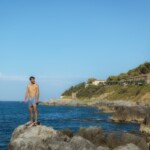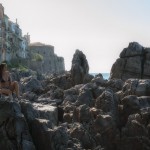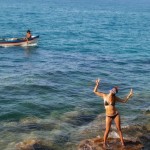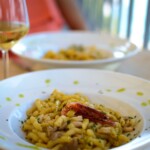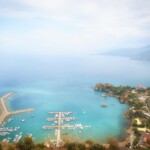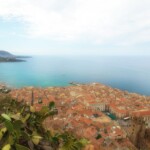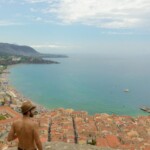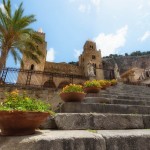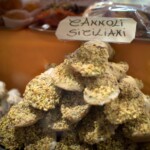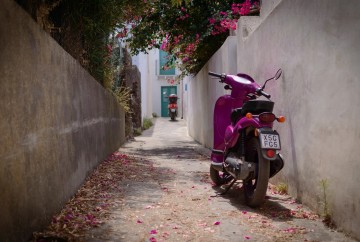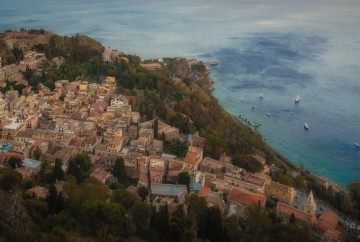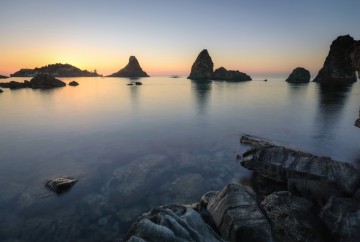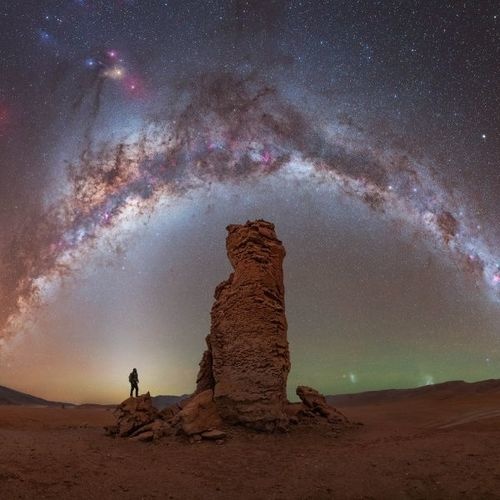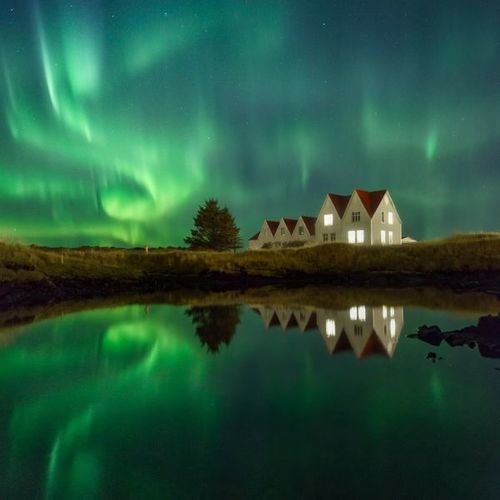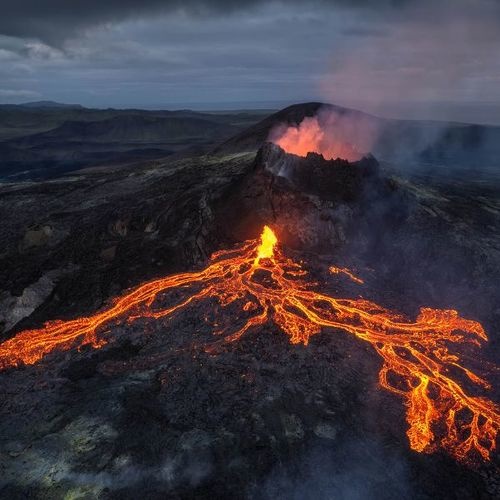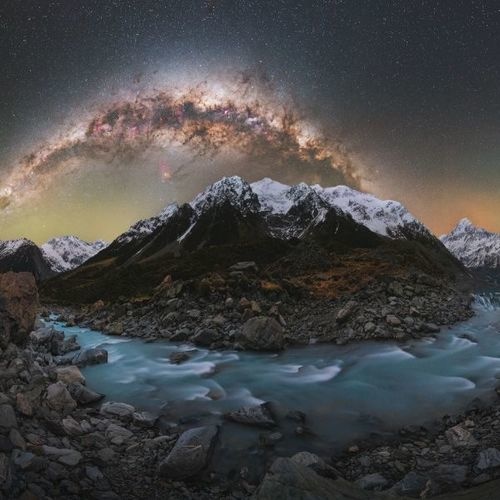When traveling abroad, get a policy from one of the best travel insurance companies. You can get a 5% discount on Heymondo, the only insurance that pays all medical bills upfront for you, HERE!
Cefalù is one of the most visited places in Sicily. While tiny in size, it does not keep thousands of tourists from visiting every day during the summer months.
The truth is that I didn’t want to spend any time of our Sicily road trip in Cefalù at first, because I thought that I would not enjoy the city amongst the summer crowd. However, not only did we managed to dodge the masses, we also discovered secret corners where we could get lost and be by ourselves.
One day is enough to visit this small city in detail. In fact, we did not even spend a night here, since the prices are extremely high compared to less touristy areas.
WHERE TO PARK IN CEFALÙ
If you plan to arrive in Cefalù by car, you should know where to park in advance, since it is not an easy task here. Being a small city, parking in the center of town is limited except for several private lots.
What we did instead, is park in the outskirts of the city for free (See details on the map).
From here, you can walk the entire Lungomare Giuseppe Giardina seafront to reach the city center. Along the walk, you will see many people early at the beach to secure a spot, because it’s just that busy during summertime. Luckily, there are alternative beaches than the crowded one in Cefalù. We’ll talk about that later.
Top things to do in Cefalù in one day
Although visiting Cefalú is one of the top things to do in Sicily, Cefalú is a pretty small town, so one day should be enough time for a visit. We started exploring the surroundings of Cefalù first, and eventually ended up in the historical center of the village.
LA ROCCA
If you visit Cefalù, I recommend is wearing good footwear because there will be a steep and rocky terrain to reach the best views of the so-called Norman Citadel.
From La Rocca, you can get a panoramic view of the whole city, and realize that Cefalú is a small fishing village trapped between the Tyrrhenian Sea and a calcareous 270-meters high rock.
My recommendation is to go up to La Rocca first thing in the morning when you get to Cefalù, especially if you visit Sicily in the summer, as temperatures get hot at midday.
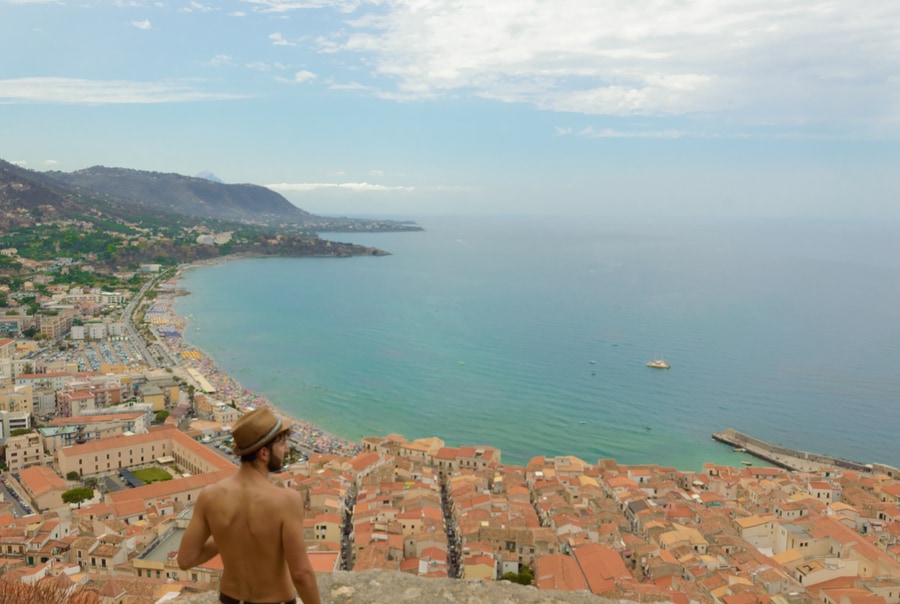
Cefalù seen from the Rocca
Although you have to first climb the 278 steps that is carved into La Rocca under the scorching Sicilian sun, you will be rewarded with amazing views and immediately understand the structure of the city. It will also be a good way to burn off all those tasty Pizze and Cannoli.
TEMPLE OF DIANA
Halfway up La Rocca is the Temple of Diana, a temple created to worship the goddess of water and the moon. It is believed that this megalithic monument was built during the ninth century BC, being the only pre-classic era monument of Sicily.
Don’t expect too much from this temple. If you didn’t see signs about the temple, you would think it is just abandoned old construction. It is a shame how ruined it is.
NORMAN CASTLE
After another half an hour of ascent, we can find the ruins of the Norman Castle. This fortification was built to protect the city from possible attacks. It also offers a 360º view of the surroundings.
From there, we could see the Nuevo Puerto Presidiana and enjoy the turquoise colour changes of the Tyrrhenian Sea.
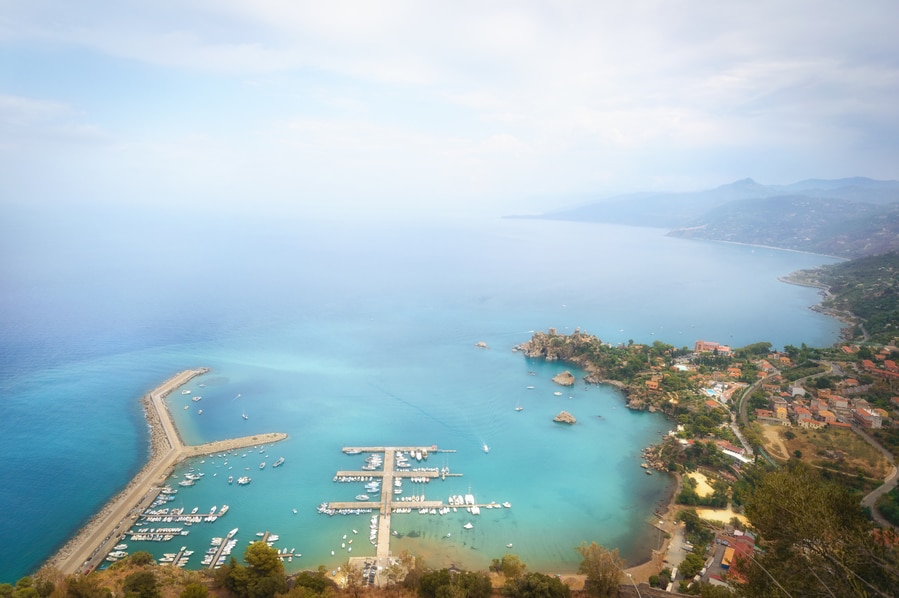
Nuevo Puerto Presidiana seen from the Norman Castle
We also discovered the Promontory of Torre Caldura, the lookout tower located on the Cape Caldura, dating back to the 16th century.
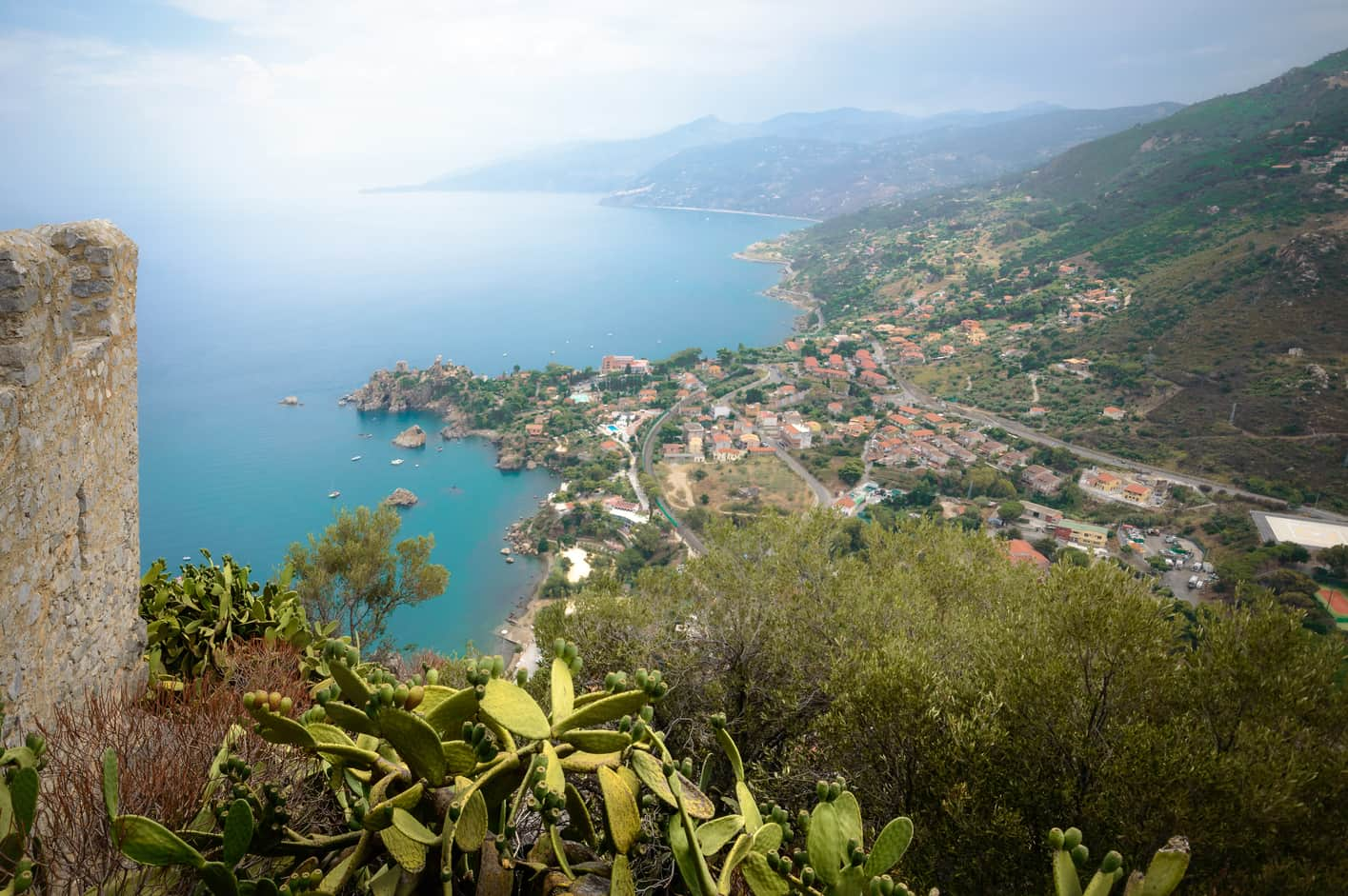
Promontorio de Torre Caldura seen from the Norman Castle
And of course, we admired the Latin cross at the Cathedral of Cefalù, the main monument of the city.
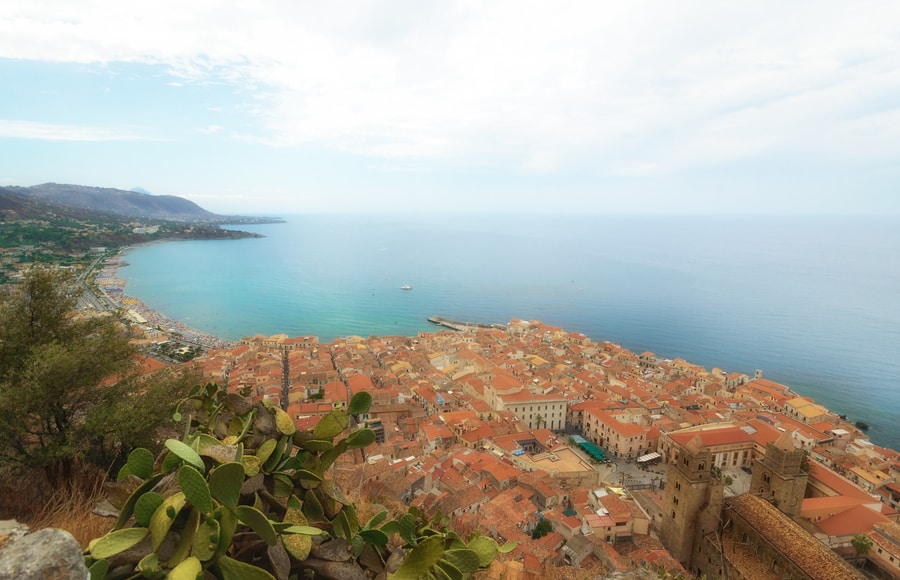
Duomo di Cefalú from La Rocca
However, what we liked most about going up to La Rocca was discovering an alternative to the crowded main beach of Cefalù.
If you look at the last image, the color of the bay on the left is nothing other than umbrellas in the sand. However, going up to La Rocca, we found the so-called Arrecife de Giudecca (Giudecca Reef), where we enjoyed the sea almost entirely by ourselves.
THE FIRE OF CEFALÚ
Also, on our walk up to La Rocca, we learned about recent sad events Cefalù. On the upper left side of the last image, you can see the mounts of Cefalù. These were unfortunately burned in a fire on June 16, 2016, about 1 month before our visit.
It was a shame to see all the charred black mounts. The worst thing was not that it will take more than 100 years to restore this, but to learn from locals that the fire was started by the mafia when the town hall withdrew ranger concession to the private company that managed this service.
This fact made us realized the mafia is unfortunately still very present in daily lives of the locals, even in other areas like waste disposal service, taxes, etc.
Top attraction in Old town cefalù
Once you descend La Rocca, I encourage you to explore the medieval old town that stands out for its cobblestone streets.
The main artery where most happenings take place is the Corso Ruggero, which marks the limit of the medieval city. However, do not follow it all the way. Get lost, look for solitary alleys and move to another century, when Cefalù was Greek, Roman, Arab or Norman.
MEDIEVAL LAundry “FIUME CEFALINO”
The access to the medieval laundry “Fiume Cefalino” is located in Via Vittorio Emanuele. This laundry attributes to Medieval times, although it is unknown when it was built. I could not leave it out of our post about things to do in Cefalù in a day.
Located at the mouth of the Cefalino creek, this laundry was carved directly in the volcanic stone. In fact, you will have to go down a stone staircase to get to it.
Several restorations throughout history have preserved it in such a way that it is one of the most visited places in Cefalù. In the last remodeling during the 19th century, bronze lion heads were added to each of the pipes that supplied the lavatory.
The water is channeled to the sea through a cleft that opens in the medieval wall still standing in Cefalù, and that leads to the port.
DUOMO DI CEFALÚ
With no doubt, Duomo di Cefalù is the most important thing you must visit in Cefalù in a day. Not all fishing villages can have a cathedral, let alone from such an early period. The cathedral of Cefalù (1131) was founded even before Palermo’s (1184).
The story behind this cathedral goes back to the time when the King of Sicily, Ruggero II, faced a sea storm on his journey from Naples to Palermo. Thinking that he was going to die, the King promised the savior that he would build a cathedral in his honor wherever he arrives safely. Upon disembarking at Cefalù, the King kept his promise and construction work began soon afterward.
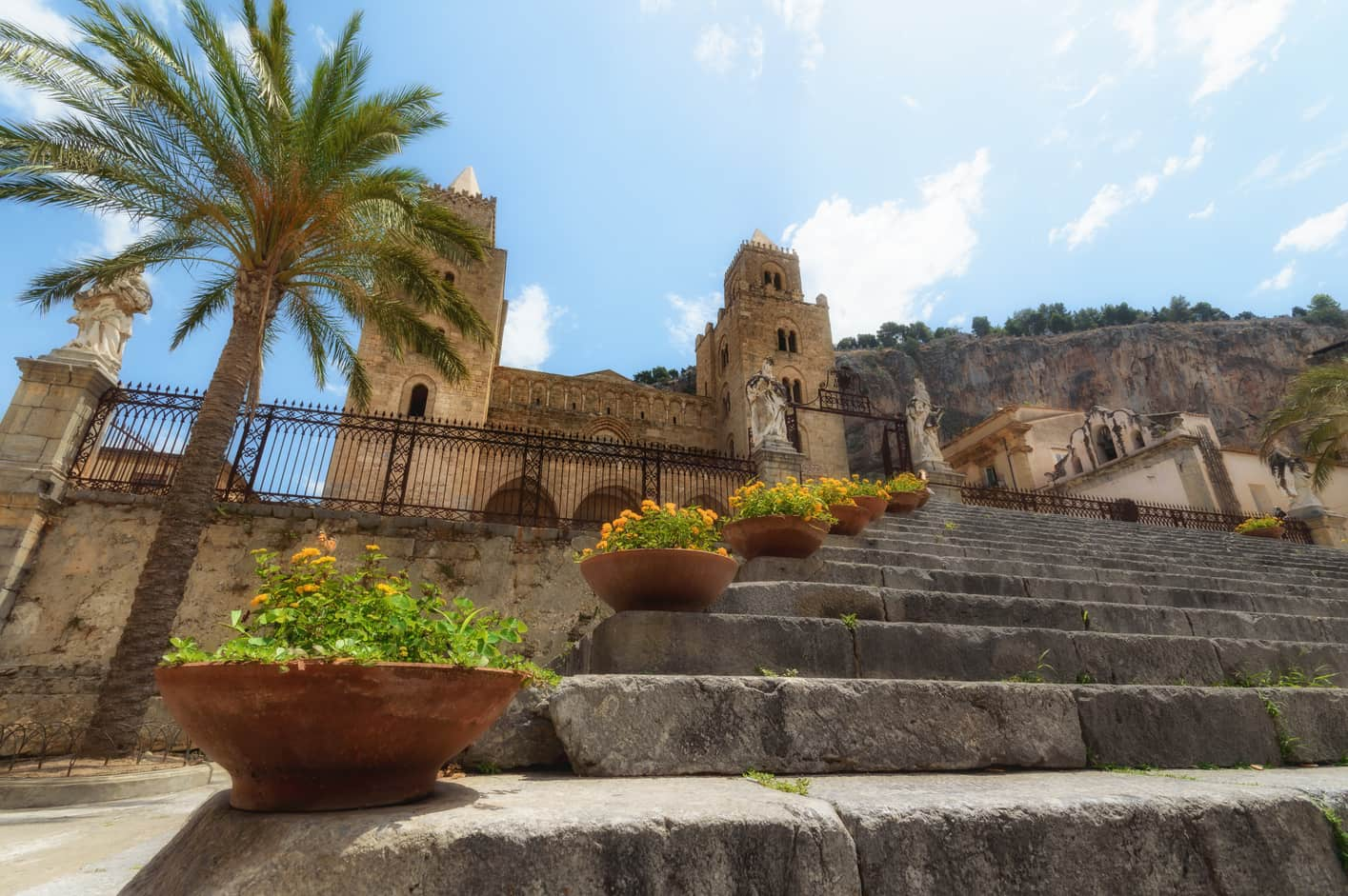
Duomo di Cefalú
The highlight of the cathedral are the rectangular towers that give an aspect of a Norman fortress. Inside, the Byzantine mosaic of the Christ Pantocrator with Arabic-Norman characteristics stands out, featuring Blonde hair (Norman) and thick dark beard (Arabic).
It has been declared a World Heritage Site by UNESCO since 2015 as part of the Arab-Norman route of Palermo, Monreale, and Cefalù. During the summer months, the visiting hours are from 8:00 a.m. to 6:00 p.m.
ALTERNATIVE to CEFALù BEACH – GIUDECCA REEF
Taking an ocean bath in the Tyrrhenian Sea is something you must do in Cefalù.
We did not want to go to the main beach of Cefalù, and instead, we looked for an access point to the Giudecca Reef after lunch, which we had discovered from La Rocca that morning.
On the map, I marked the postern where we descended through to the reef, as it is not easy to find. We went across the oldest streets we saw in Cefalù. Without a doubt, this area is the most historic and least reformed of the town. To get to the sea you have to literally cross the medieval wall that appears in the movie Cinema Paradiso.
I must say that the reef is nothing more than a volcanic rock terrain that has formed into the sea. The difficult access helps you find a place of peace and tranquility, and as a bonus, it is even much closer to the historic center than the beach of Cefalù.
You’ll find yourself alone here, even though it may seem impossible in such a crowded place like Cefalù during summertime. However, privacy is not guaranteed as the Norman wall that turned into houses has a view of this area.
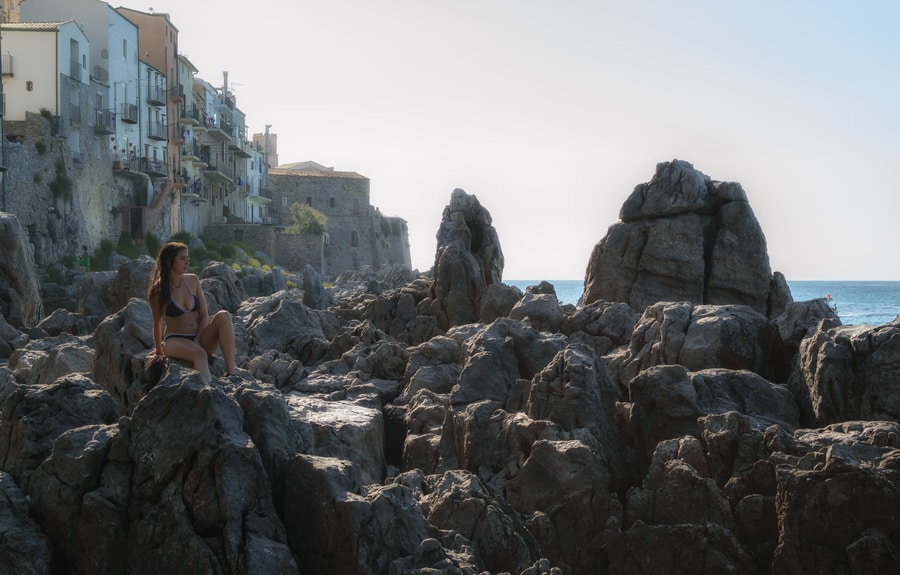
Via Giudecca
Although there is no fine sand where you can lie down, the place cannot be more suitable for diving. Don’t forget your goggles!
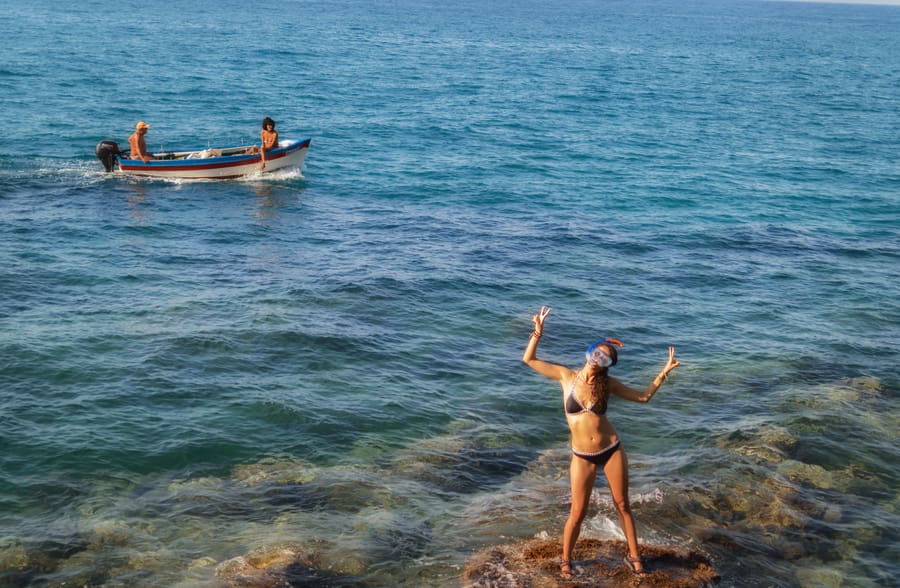
Diving at the beaches of Via Giudecca
From this area, you can see the restaurant Al Faro, where we had lunch.
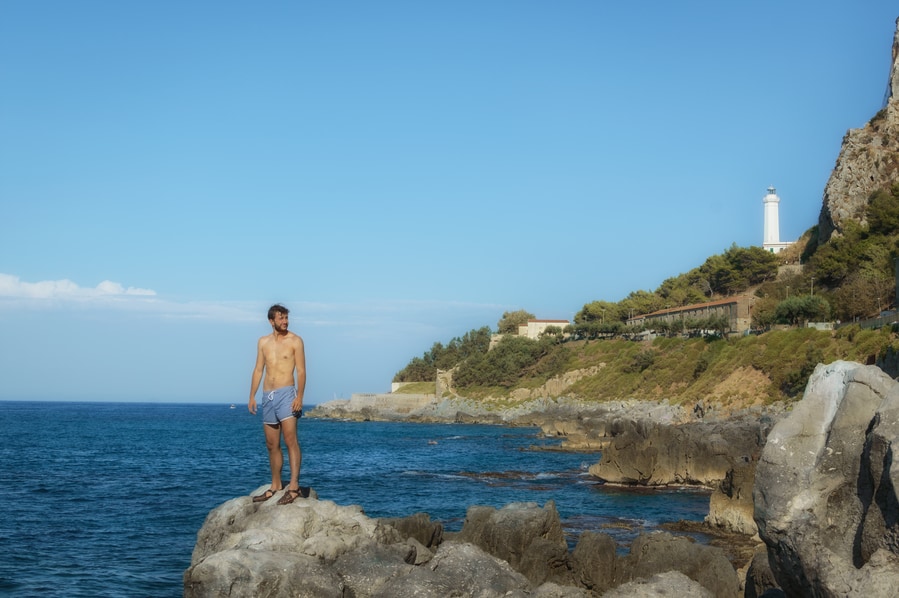
Giudecca Reef
Where to eat in cefalù
Al Faro
We had lunch at a restaurant called Al Faro on the day we spent in Cefalù. We found it by chance while looking for an access point to the Giudecca Reef.
The restaurant has a terrace right on the cliff that overlooks the Giudecca Reef, on the street with the same name, and is located at the foot of the Cefalù Lighthouse.
In this “Ristorante”, as in most of Sicilian restaurants, the typical dish was pasta with seafood or fish. Luckily for me, there was also a veggie option.
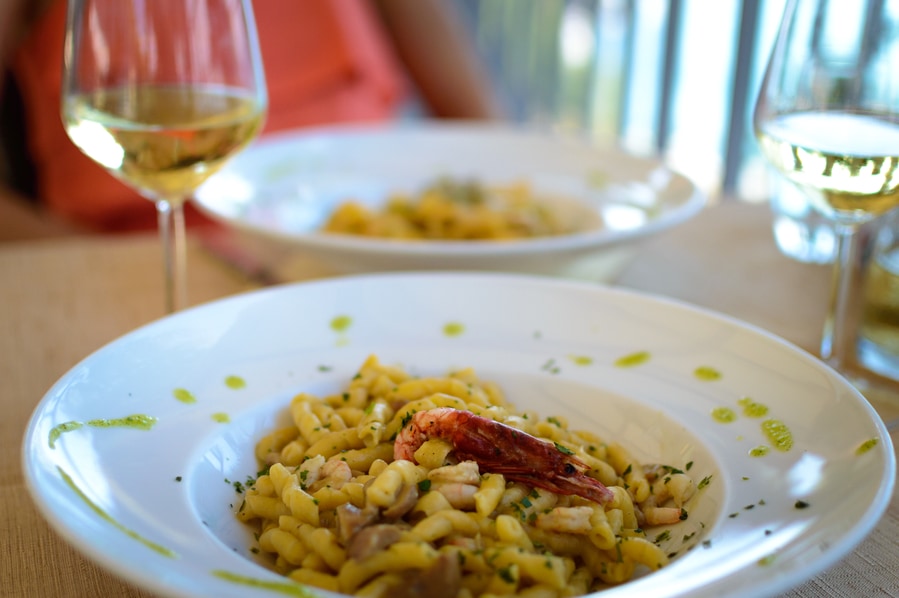
Pasta at the terrace of Al Faro restaurant
We also enjoyed our first of many mezzi litri di bianco della casa.
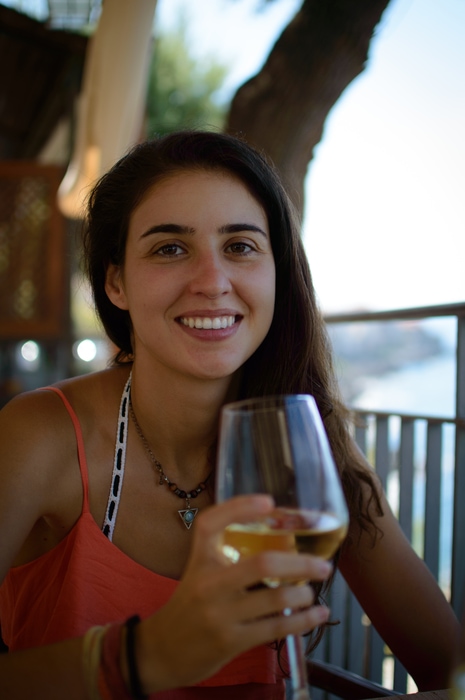
Al Faro Restaurant in Via Giudecca
Duomo Gelatieri
Another gastronomic delight that we tried in Cefalú was at the cathedral square. It is a pastry and ice cream shop called Duomo Gelatieri located at the corner of Corso Ruggero street.
Before saying goodbye to Cefalù, we went back there to buy a few cannoli and they proved to be the best ones of the trip. The ricotta cream, the crunchy outside and the pistachio pieces were absolutely delicious.
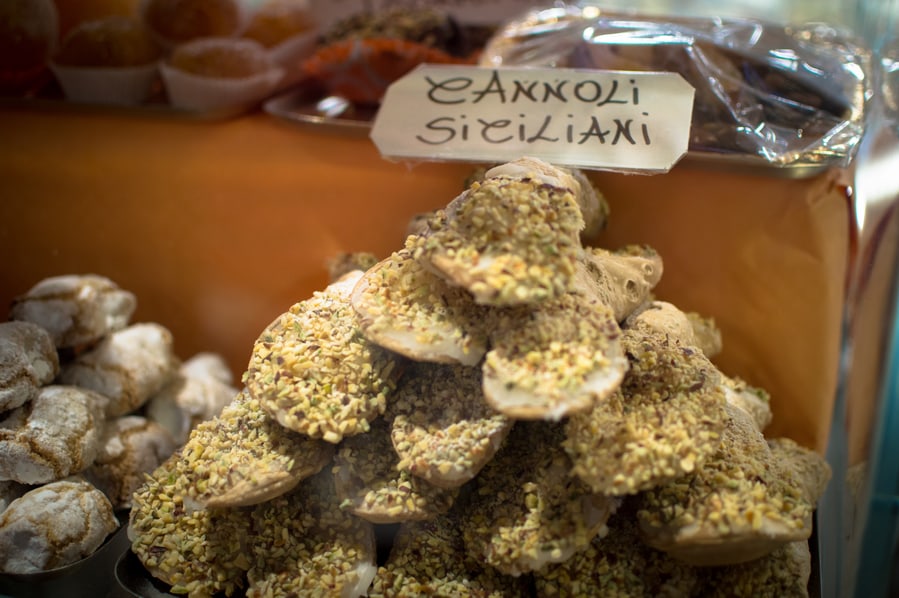
The best Cannoli of Sicily in Duomo Gelatieri
If you are one of those who enjoys tasting all local food, I recommend you to have a good international medical insurance, since in Italy and more specifically in Sicily, we will be constantly testing new recipes. Also, remember that it is essential to have travel insurance to Europe if you are not from there.
accommodation in cefalù
We did not stay in Cefalù since prices skyrocket during summertime with the high demand.
The best we found in terms of quality, price, and location is this apartment.
If you are looking for something cheaper, you can look at this accommodation.
If you want to save even more, you can find some hotels further away from the center that cost under €50. Cefalù is small, you will not have problems getting from one place to another quickly.
If the three options that we proposed do not convince you, you can always look for other accommodations in Cefalù from here.
If you book your hotel using our booking links, we receive a small commission that does not affect the price paid by the reader. This way you can help us continue with this project.
How to get to Cefalú
If you are traveling around Sicily by car, Cefalù is about an hour from Palermo on the E90 highway that runs through the north of the island.
We only spent a day in Cefalù, in order to catch a ferry to Stromboli from Milazzo early morning after.
If you are heading east at sunset time, I suggest taking a section of the SS113 instead of following the E90 road. This road goes along the coast, simply separated from the sea by the train tracks.
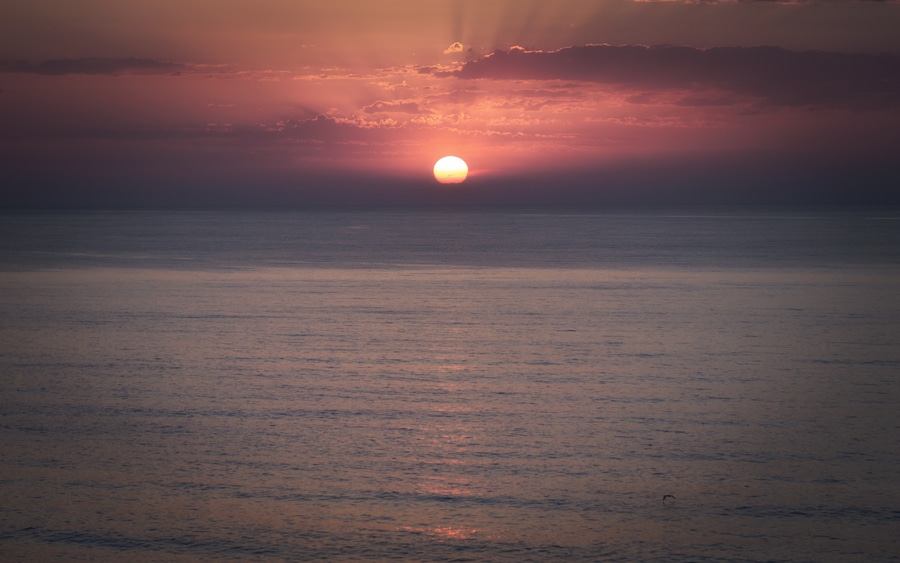
Sunset from the SS113 Road
Suddenly a train passed and the scene was perfect to close our day in Cefalù.
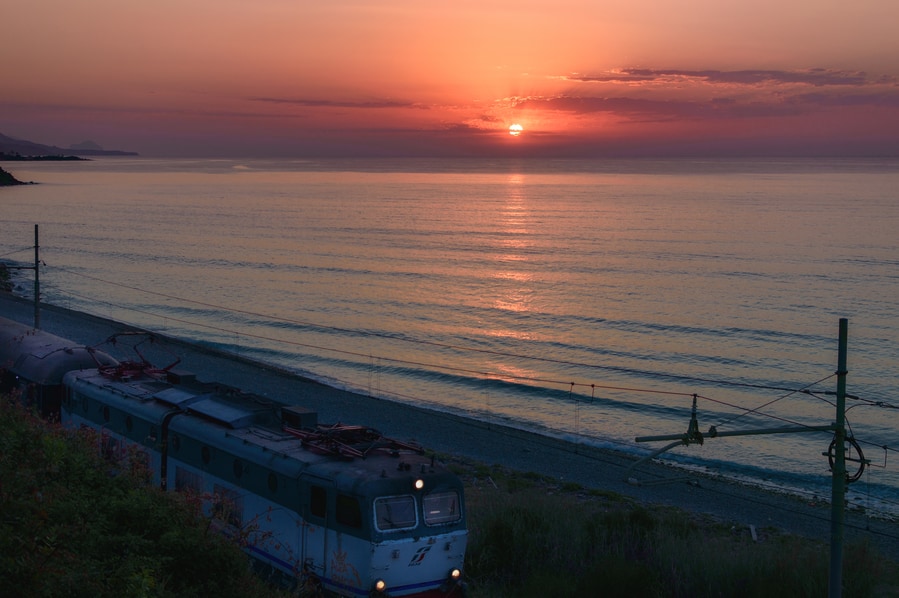
Train passing next to the SS113 road between Cefalù and Milazzo
